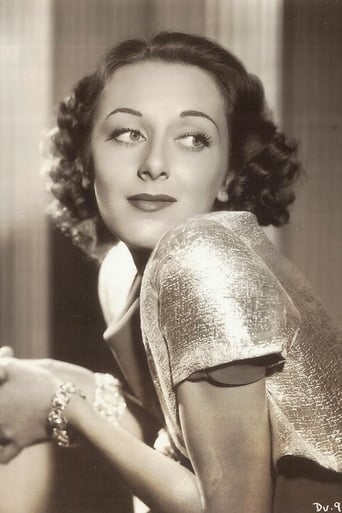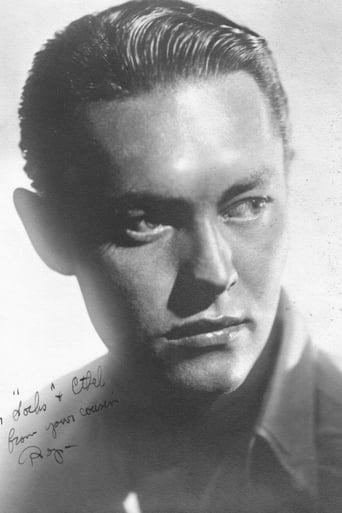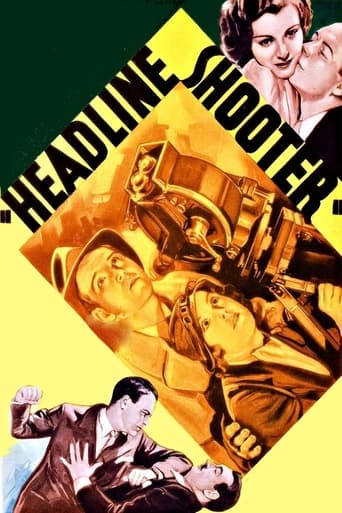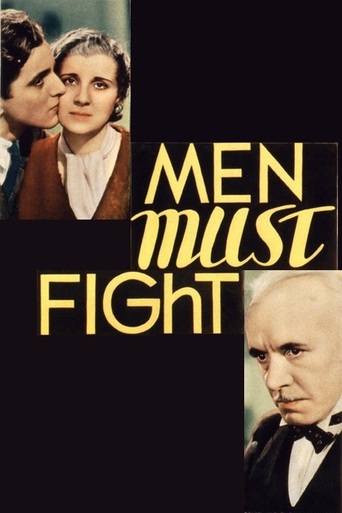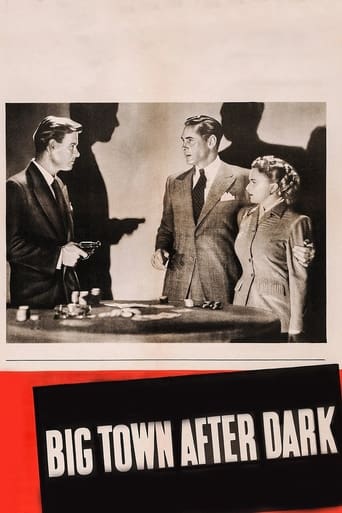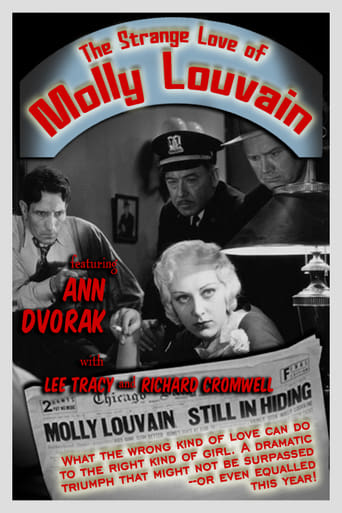

The Strange Love of Molly Louvain (1932)
A fast-talking reporter befriends a young woman and her male companion who are wanted for a policeman's shooting.
Watch Trailer
Cast


Similar titles
Reviews
Wonderful character development!
i must have seen a different film!!
It's entirely possible that sending the audience out feeling lousy was intentional
At first rather annoying in its heavy emphasis on reenactments, this movie ultimately proves fascinating, simply because the complicated, highly dramatic tale it tells still almost defies belief.
Anne Dvorak got into silent films as a child, and was the perfect age to star when talkies began. In addition, the film code wasn't in yet, so they could still accurately reflect ALL types of relationships.. in one of her first credited roles, Dvorak is Molly, who always dreams of marrying her own prince charming. Some real adult themes in this one, and good thing it was before the film code. Trying to avoid any spoilers, but she cozies up to the bad guy when the nice guy bails out on her. Guy Kibbee is "the cop". Co-stars Lee Tracy, who made some great films with Jean Harlow. Frank McHugh is in here, yet again, as a newspaper reporter. It's another Michael Curtiz film, waaaay before Casablanca. It's your typical girl-caught-up-with-gangsta film from the early 1930s. At least she doesn't use the squeaky high baby voice that so many used during that period. It's ok. has its ups and downs. It is refreshing to see real life situations, after so many white-washed films in the 1930s and 1940s. Shows on Turner Classics now and then.
In one of her few leading roles, the powerful dramatic actress Ann Dvorak tries to get past a mediocre script involving a troubled young woman trying to get through her own mediocre past. She's pregnant out of wedlock, abandoned by the wealthy father (disappearing without a trace thanks to an obviously possessive unseen society matron mother), and in her effort to support her child, ends up a fugitive in hiding with reporter Lee Tracy trying to get the goods on her. The non-sensical situation lacks in any real character motivation or believable plot development and culminates with Tracy stealing her from her obviously decent boyfriend (Richard Cromwell) seemingly so he can expose her as the notorious moll she's gained an undeserved reputation for being.While not unattractive, Dvorak didn't have traditional leading lady looks which made her perfect as the other woman, gangster's moll or scheming sister to the heroine. Photographing rather harshly, the switch of her hair color from black to blonde accentuates that even more. This is pretty much no different than the women's soap opera type films which starred such Warners contract players as the very young Bette Davis, Barbara Stanwyck, Kay Francis, Joan Blondell or Jean Muir, but Dvorak lacks their obvious vulnerability and the script lacks conviction. Much of the supporting cast is wasted, but there are good moments for Tracy (especially his kind-hearted send-off of Cromwell) and Charles B. Middleton as a very assertive police sergeant. The pre-code spark is there amongst a few spicy lines but that isn't enough to make this one memorable.
Molly Louvain is a girl who has become pregnant by a rich young fellow that loves her and wants to marry her. He has told her that he intends to tell his mother that night before Molly gets to his house to attend his birthday party. However, when Molly shows up at the family estate she is told by the butler that mother and son left suddenly for Europe. Apparently Molly's fiancé loved mother's millions more than he loved Molly and no doubt Molly's would-have-been mother-in-law could not tolerate the idea of a member of the huddled masses being her future daughter-in-law. All alone in the world, Molly turns to shady character Nicky Gant, who takes her away from her home town and out on the road. Molly figures he's possibly financing their way with stick-ups, but Molly asks no questions as she has a baby to think of. One day Nick gets in a shoot-out with the cops with Molly at the wheel of the car, and suddenly Molly is up to her neck in Nick's past and present illegal activities. She dyes her hair blonde and decides to hide out under a false name in a small apartment until the heat is off. Molly has two problems that complicate matters even further - she is unable to go check on her baby, who she has left with kindly acquaintances, and ambitious reporter Scotty Cornell lives across the hall and is determined to find Molly Louvain and crack the story of a lifetime. This film is watchable largely because nobody plays a woman suffering from the internal moral struggle of good versus evil like Ann Dvorak (as Molly Louvain) and nobody plays the smart aleck reporter that will do anything for a story like Lee Tracy (as Scotty Cornell). However, the film seems incomplete in so many ways. There is no chemistry between Tracy and Dvorak at all, and a story like this needs their chemistry in order to have their relationship in the film seem something other than tacked on. The ending is also woefully incomplete. It seems like Warners ran out of budget and the powers that be just said "stop here and write some dialogue to round this thing out".I'd recommend this just to see Lee Tracy and Ann Dvorak do the kind of acting they do best, just don't expect the kind of precode sizzle you saw in any of James Cagney's and Joan Blondell's films.
Whatever it was, it's too bad there doesn't seem to be any of it left. Warner Bros. pre-code was like a renaissance atelier - genius in the air, tons of talent on hand, cranking out, if not masterpieces, some unforgettable confections. Tons of bit part players in this one, it's as though they couldn't let anyone just walk on and act, the scene had to be chewed through. This sometimes seems distracting when you're caught up in the story, which, as with "Three on a Match," uses the threatened child to keep you in suspense. But with Lee Tracy and Ann D., plus all these superb faces and shticks, can anyone really complain? Worthwhile to think about why this Warner Bros. vision of life seems to get tremendous lift from exploiting a certain idea of the US press, never better represented than by Tracy - at least until Grant in "His Girl Friday."


